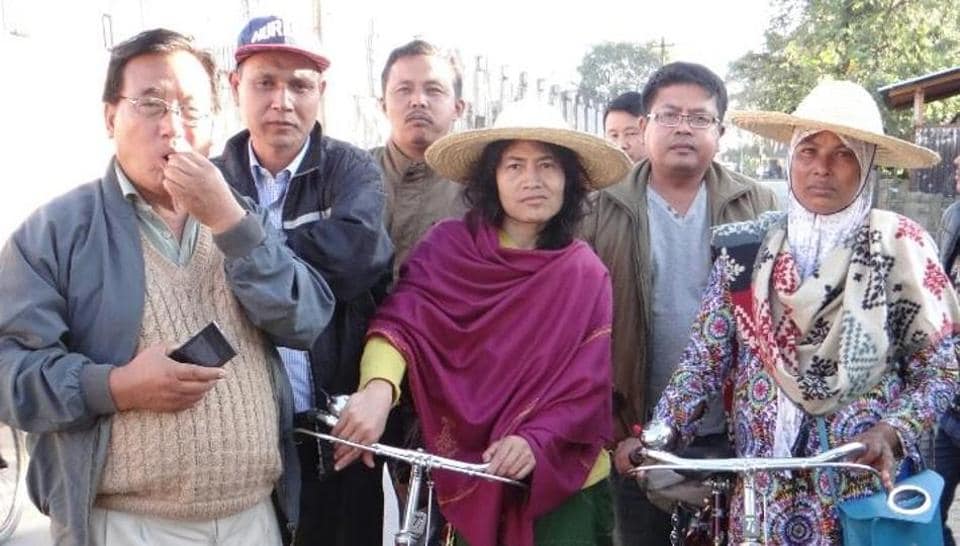Manipur badly needs more women elected representatives to assure gender equality and overall economic and social empowerment – and all political parties need to work to make this happen.
The dates for the 2022 elections to the Manipur State Legislative Assembly have just been announced, and there is much excitement as prospective candidates jostle for tickets. The elections are a festival of democracy – and a chance for the people to have their say by casting their votes. Indian democracy, despite its many imperfections, has overall been a great leveller. It has provided a voice and representation to diverse sections of society – including those from groups that have been traditionally economically or socially disadvantaged. However, when it comes to women’s participation, the picture is far from rosy – and this is especially true in Manipur.
As per the National Family Health Survey (NFHS) 2021, the sex ratio in Manipur is 1066 females per 1000 males. This means that more than 50% of Manipur’s population is female. However, in the 2012 elections, only 3 women were elected as Member of Legislative Assembly (MLA) in Manipur out of a total of 60 MLAs. This number then fell to 2 women MLAs in the subsequent legislative assembly elections in 2017. That means that less than 5% of the MLAs in Manipur are women, even with women constituting well over half the population. By any yardstick, this is gross under representation.
In any democracy, if a very significant section of the population is practically unrepresented in electoral and legislative processes, it has adverse consequences. Firstly, it raises questions about whether the institutions – both legislative and executive – even represent the will of the people and their aspirations in a true sense. And secondly, it leads to major distortions in ensuring the social and economic wellbeing and empowerment of this very large portion of the population, without which overall development suffers and poverty remains entrenched.
It is obvious that the lack of women’s representation – both in the state assembly as well as other bodies such as town councils and so on – means that issues important to women are taking a backseat in the legislative and political agenda. The NFHS shows significant gaps in women’s access to both education and the internet. Consider these figures for rural Manipur:
10 or more years of schooling by percentage:
Men – 52.7
Women – 40.6
Used the internet at least once by percentage:
Men – 68.2
Women – 40.4
Similarly, the NFHS shows that women are also disadvantaged compared to men when it comes to access to healthcare and nutrition. The figures on economic empowerment are even more stark – only 42% of the women who worked in the past 12 months were paid in cash for the same, and only 72% of women have a mobile phone which they use themselves (compared with nearly 100% of men). Apart from this, nearly 40% of the married women in the 18 – 49 age group in Manipur have experienced spousal violence.
If over 50% of our population is not being allowed equal access to education, healthcare, jobs and the internet, this is a huge missed opportunity and a drag for society as a whole. And we will not keep these issues at the front and centre of our law making and development processes unless women have a stronger voice in the corridors of power. The International Monetary Fund (IMF) estimates that equal participation of women in the workforce in India will increase the country’s Gross Domestic Product (GDP) by a stupendous 27%. Think of that in the context of a state like Manipur – a buoyant state GDP means vastly improved standard of living for our people through better physical infrastructure, schools, healthcare and environment. Why would we want to knowingly forego this?
We at Eta Northeast Women’s Network would like to call upon all political parties to reflect on this as our 2022 elections approach. Eta requests that all major parties voluntarily ensure that at least 30% of their candidates are women. While Eta is a non-political organization and is not affiliated to any political party, we will support all women candidates with a clean background regardless of the party from which they stand for elections. Apart from this, we are also willing to help any political party that approaches us review and frame items on their political manifestos related to gender equality and women’s empowerment. And finally, we will plan to hold programs to train women in areas such as public leadership and policy formulation to ensure that the next generation of women representatives – whether state or local – is well equipped to contribute to the development of society as a whole.












